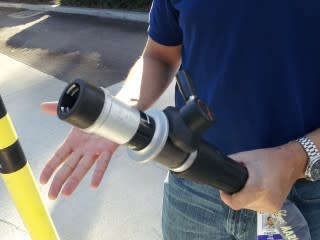Volkswagen Golf SportWagen HyMotion: Hydrogen Fuel-Cell Concept At LA Auto Show
Very few compact wagons remain on sale in North America, but this year, the car known to U.S. buyers for years as the Jetta SportWagen has a new name: the 2015 Volkswagen Golf SportWagen.
To reinforce the new wagon's new model name, VW showed off two concept Golf wagons at last week's Los Angeles Auto Show.
The greener of the two was the Volkswagen Golf SportWagen HyMotion, meant to show off the flexibility of VW's modular architecture in handling a variety of different powertrains.
DON'T MISS: 2015 VW Golf TDI SportWagen Concept: New York Auto Show Debut
The seventh-generation 2015 VW Golf is already available with TSI gasoline, TDI diesel, and e-Golf battery-electric powertrains.
But its underlying "MQB" modular architecture has also been designed to accommodate both hydrogen fuel-cell and natural-gas powertrains as well.
Using parts from plug-ins, hybrids
The Golf SportWagen HyMotion concept uses four slim carbon-fiber hydrogen tanks--two under the rear seat, the other two beneath the load bay--that store compressed hydrogen at 10,000 psi.
The hydrogen powers a fuel cell located in the "engine" compartment ahead of the firewall. Power electronics are in the tunnel between the front seats.

The fuel cell produces electricity that powers a 100-kilowatt (134-horsepower) electric motor driving the front wheels, adapted from the one used in the 2015 Volkswagen e-Golf electric car.
For high power demands and to help start the fuel cell, a 1.1-kilowatt-hour lithium-ion battery adapted from that used in the VW Jetta Hybrid is located above the rear axle. It's continually recharged via regenerative braking.
ALSO SEE: 2016 Toyota Mirai Priced At $57,500, With $499 Monthly Lease
Acceleration from 0 to 60 mph takes roughly 10 seconds, VW says, and the hydrogen tanks provide up to 500 km (310 miles) of driving range, with a refueling time of roughly 3 minutes.
Both those specifications are roughly equivalent to those of the 2016 Toyota Mirai dedicated hydrogen fuel-cell sedan introduced at the LA Show last week.

 Yahoo Autos
Yahoo Autos 
